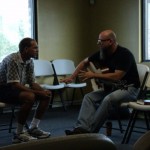Pervasive Mutuality – 1 Peter 4:7-11
Whenever I talk about mutuality, I tend to focus on a few passages, such as Ephesians 4:7-16 or 1 Corinthians 14:26-40. However, mutuality (the one-another’ing aspect of our lives together in Christ) is actually very pervasive (widespread) in Scripture.
One of those mutuality passages is 1 Peter 4:7-11. In his first letter, Peter writes about suffering while living in Christ. In chapter 4, Peter talks about those who are choose to live their own way and are surprised with God’s people refuse to go along with it.
According to Peter, what should our response be when we are maligned because we refuse to live according to immoral cultural norms? He writes:
The end of all things is at hand; therefore be self-controlled and sober-minded for the sake of your prayers. Above all, keep loving one another earnestly, since love covers a multitude of sins. Show hospitality to one another without grumbling. As each has received a gift, use it to serve one another, as good stewards of God’s varied grace: whoever speaks, as one who speaks oracles of God; whoever serves, as one who serves by the strength that God supplies—in order that in everything God may be glorified through Jesus Christ. To him belong glory and dominion forever and ever. Amen. (1 Peter 4:7-11 ESV)
So, what is Peter’s answer to living in a society filled with “living in sensuality, passions, drunkenness, orgies, drinking parties, and lawless idolatry”? (1 Peter 4:3 ESV) His answer is self-control, sober-mindedness, love, hospitality, and service. While the first couple of things (self-control and sober-mindedness) can be personal, the last three are very practices of mutuality: love, hospitality, and service.
In this passage, Peter stresses love, because, as he says, “love covers a multitude of sins.” It’s clear that he’s talking about sins among and between brothers and sisters in Christ, since he introduced this with “keep loving one another earnestly.” In other words, even when someone sins against you or sins against your sister/brother, keep on loving that person earnestly – really – truly – in deed, not just in words. (By the way, I find it both interesting and important that almost every “mutuality” passage in Scripture includes a focus on love.)
Next he encourages his readers to open their homes to one another and practice hospitality “without grumbling.” While hospitality is always an important way for us to demonstrate our love and support to our brothers and sisters in Christ, it becomes even more important when Christians are being persecuted. When we open our homes, we share our lives, and this is extremely important to our maturity in Christ.
Finally, Peter concludes this mutuality passage with a focus on spiritual gifts. Believe it or not, this is my favorite scriptural passage on spiritual gifts. Peter reminds us that these gives are given to us for the sake of others – to serve them -not for our own sake. I love how Peter boils down all spiritual gifts into two categories: speaking and serving. And, whenever we do those things, we do them from God, not from ourselves.
Once again we see that mutuality among the body of Christ is extremely important and is found throughout the writings of Scripture.
Pervasive Mutuality – Jude 20-23
Whenever I talk about mutuality, I tend to focus on a few passages, such as Ephesians 4:7-16 or 1 Corinthians 14:26-40. However, mutuality (the one-another’ing aspect of our lives together in Christ) is actually very pervasive (widespread) in Scripture.
One of those mutuality passages is Jude 20-23. Most people know that Jude writes about false teachers that had attached themselves to the church. He tells his readers that God would judge these false teachers just as he had judged others in history. But, what was the church supposed to do about these false teachers?
These are the only instructions that Jude gives directly to the believers reading his letter:
But you, beloved, building yourselves up in your most holy faith and praying in the Holy Spirit, keep yourselves in the love of God, waiting for the mercy of our Lord Jesus Christ that leads to eternal life. And have mercy on those who doubt; save others by snatching them out of the fire; to others show mercy with fear, hating even the garment stained by the flesh. (Jude 20-23 ESV)
Interestingly, Jude never tells his readers to confront the false teachers. He never tells them to correct them. That doesn’t mean that confrontation or correction is wrong. Instead, it shows that neither confrontation nor correction was the focus for Jude.
What was his focus? His focus was on the continued growth of the believers who were reading his letter. And, he knew that growth would only happen if they worked together to help each other grow in maturity – even in face of false teaching. Why? Because shared life and shared service and shared discipleship is stronger than any false teacher.
How were the believers supposed to respond to false teachers? By continuing to keep themselves in the love of God by building up (edifying) each other and praying. In other words, Jude’s response to false teachers is mutuality – the whole church working together to help each other mature in Jesus Christ. In fact, instead of telling his readers to respond or react to the false teachers, he tells them to “[wait] for the mercy of our Lord Jesus Christ.”
And, what should the church do about those who follow these false teachers? Again, mutuality is the answer. They are to show mercy to those who need it and rescue those who will accept their help.
Perhaps most interesting to me is the fact that, in the face of false teaching, Jude does not tell his readers to keep themselves in the “truth of God.” He tells them to keep themselves in the love of God. Obviously, there is some correlation between God’s truth and God’s love, but it’s intriguing that Jude focuses on God’s love as a response to false teaching.
And, again, it’s not each person keeping himself or herself in the love of God. Jude envisions the church working together to help each other reamin in the love of God. Once again, a beautiful picture of mutuality where we might not expect it.
Pervasive Mutuality – Hebrews 12:12-17
Whenever I talk about mutuality, I tend to focus on a few passages, such as Ephesians 4:7-16 or 1 Corinthians 14:26-40. However, mutuality (the one-another’ing aspect of our lives together in Christ) is actually very pervasive (widespread) in Scripture.
One of those mutuality passages is Hebrews 12:12-17. This passage follows the very famous passage at the beginning of Hebrews 12 in which the author exhorts his readers to set aside distractions and sin and to “look to Jesus.” Next, the readers are encouraged to trust God and his love for them in spite of any “discipline” they may be facing.
After that section on discipling (“For the Lord disciplines the one he loves”), the author writes:
Therefore lift your drooping hands and strengthen your weak knees, and make straight paths for your feet, so that what is lame may not be put out of joint but rather be healed. Strive for peace with everyone, and for the holiness without which no one will see the Lord. See to it that no one fails to obtain the grace of God; that no “root of bitterness” springs up and causes trouble, and by it many become defiled; that no one is sexually immoral or unholy like Esau, who sold his birthright for a single meal. For you know that afterward, when he desired to inherit the blessing, he was rejected, for he found no chance to repent, though he sought it with tears. (Hebrews 12:12-17 ESV)
From first glimpse, it appears that the author is exhorting each reader to lift up his own drooping hands or strengthen her own weak knees. It seems that each reader is instructed to make straight paths for each one’s own feet. However, as we keep reading, we realize that these commands are much more mutual than that, especially when we get to verse 15.
Although verse 15 in the translation above begins with a command, it is actually in the form of a participle: See[ing] to it that no on fails to obtain the grace of God. And, to make this an even stronger statement, the verb translated “See to it” is the same verb that is normally translated “oversee.” (It’s actually the same form of the verb found in 1 Peter 5:2 when Peter is addressing “elders.”)
Thus, the author is exhorting his readers to “oversee” each other to ensure that no one fails to live in the grace of God, that no “root of bitterness” grows in anyone’s heart, and that no one falls into sexual immorality. As you can tell, these are issues of spiritual oversight, and we are all responsible for “overseeing” each other.
From this passage especially, we can see that the meaning of the verb “oversee” is very close to the meaning of the verb “consider” in this passage (which is another of my favorite when it comes to mutuality):
And let us consider how to stir up one another to love and good works… (Hebrews 10:24 ESV)
Yes, it is all of our responsibilities to look into one another’s lives, to help each other follow Jesus Christ, and to help one another grow in maturity together. This is what mutuality among the church is all about.
Pervasive Mutuality – 1 Thessalonians 5:11-14
When I talk about or write about mutuality among the church, I tend to focus on a few passages, such as Ephesians 4:7-16 or 1 Corinthians 14:26-40. However, mutuality is much more pervasive in Scripture than these or other popular passages.
For example, there is an awesome passage in 1 Thessalonians that paints a beautiful picture of mutuality among the church while combining the work of mature believers (leaders) and the work of all believers as they help each other grow in Jesus Christ together.
Here is the passage:
Therefore encourage one another and build one another up, just as you are doing. We ask you, brothers, to respect those who labor among you and are over you in the Lord and admonish you, and to esteem them very highly in love because of their work. Be at peace among yourselves. And we urge you, brothers, admonish the idle, encourage the fainthearted, help the weak, be patient with them all. (1 Thessalonians 5:11-14 ESV)
Now, before I get started, I need to say that there is one part of the translation above that I think is problematic. It’s the participle translated “[who] are over you.” Given the broader teachings in Scripture and the range of meanings of this verb, I think it’s much better translated as “[who] care for you.”
The passage begins with a general exhortation to “encourage one another and build up one another” (1 Thessalonians 5:11) and the praise that they (the Thessalonians) are already doing that. It’s important that this instruction about encouragement and edification follows the statement, “For God has not destined us for wrath, but to obtain salvation through our Lord Jesus Christ, who died for us so that whether we are awake or asleep we might live with him.” (1 Thessalonians 5:9-10 ESV) Thus, for those of us who are still “awake,” we encourage and build up one another to continue to “live with him.”
Next, Paul follows this general exhortation toward encouragement and edification with 1) a recognition that some are more mature and capable in their ability to encourage and edify and 2) an exhortation for all to do the work of encouragement and exhortation.
First, Paul says that we should highly respect those who are actually working hard among the church, who are caring for others, and how are teaching and admonishing each other. (1 Thessalonians 5:12-13) (By the way, notice how this passage is parallel to 1 Timothy 5:17, which may help us understand what Paul means by “double honor” in his letter to Timothy.) Paul has also offered himself and his apostolic co-workers as examples of what it means to “work hard” among the church and care for others. (1 Thessalonians 2:5-12) I do not think Paul is intending to point out certain offices, positions, or titles here. He could have easily said “elders” or “overseers.” Instead, he points to those who are actually doing the work among the church what all should be doing, whether they have been recognized (as elders) for that example or not.
Next, Paul does not stop at the work of these leaders. He continues to exhort all the brothers and sisters to encourage and edify one another using very similar language that he used when referring to the leaders previously. (1 Thessalonians 5:14) Putting these last three verses together, we see that Paul expects all believers to encourage, admonish, help, and show patience (among other things), while offering respect to those who are actually doing these things consistently.
Again, this is not a very popular passage when it comes to mutuality. It’s not one of the passages that are often quoted to encourage the church toward one another’ing. But, it’s a very important passage because it shows how leaders and the whole church work together for the encouragement and edification of all.
Guest blogger: The Rich Young Pastor
From time to time, I invite people to write “guest blog posts” for this blog. There are several reasons for this: 1) To offer different perspectives. 2) To generate even more discussion and conversation between blogs. 3) To introduce other bloggers to my readers.
(If you are interested in writing a guest blog post, please contact me at alan[at]alanknox[dot]net.)
Today’s post was written by Neil Braithwaite. I “met” Neil about a month ago when he emailed me after coming across my blog. You can find out more about Neil at the following web sites: http://honorgodsword.com/ and http://thepersecutedchristian.com/.
——————————————-
The Rich Young Pastor
One day Jesus met a pastor who had grown-up in the church, attended Christian college and seminary and upon graduation moved from church to church working his way up the financial ladder starting as an associate youth pastor for a mere $20,000 salary and finally at age thirty-five to senior pastor of a large denominational church making over $75,000 with full benefits and a great retirement package.
The pastor told Jesus he had been working very hard since seminary and felt greatly blessed to have been called on every occasion to a church offering a larger salary and better benefits. He also told Jesus he was looking forward to his reward in heaven for a life of sacrificial service as a full-time pastor and preacher of the gospel. The pastor told Jesus he had done his best to follow all His commands and examples and asked Jesus if there was anything at all he could do with the rest of his life to please Him more.
Jesus said to the pastor, “Truly I say to you, as a vocational pastor you have your reward in full. Stop accepting a salary, get a job to support yourself and your family and continue to shepherd your flock and preach the gospel at no charge – and then you will have treasure in heaven.”
Jesus went on to remind the rich young pastor that you cannot serve both God and money, it is more blessed to give than receive, and freely you have received – freely you should give.
When the pastor heard these words from Jesus he went away grieving because making a living by preaching the gospel was all he ever wanted to do and all that he knew, and he wasn’t about throw away all he had worked so hard for by relinquishing his right to charge for the gospel.
“Then Peter said to Him, ‘Behold, we have left everything and followed You; what then will there be for us?’ And Jesus said to them, ‘Truly I say to you, that you who have followed Me, in the regeneration when the Son of Man will sit on His glorious throne, you also shall sit upon twelve thrones, judging the twelve tribes of Israel. And everyone who has left houses or brothers or sisters or father or mother or children or farms for My name’s sake, will receive many times as much, and will inherit eternal life. But many who are first will be last; and the last, first.'” Matthew 19:27-30
Scripture… As We Live It #263
This is the 263rd passage in “Scripture… As We Live It.”
For sin will have no dominion over you, since you are not under law but under grace… well, you’re still under part of the law, and you know which part I’m talking about… that part that you know everyone should still keep. (Romans 6:14 re-mix)
(Please read the first post for an explanation of this series.)
Replay: There’s a lot of talk about discipleship
Four years ago, I wrote a post called “Alot of talk about discipleship.” There are so many lectures, classes, seminars, sermons series, books, and conferences about discipleship. Some people seem to lead conference after conference on the topic of discipleship… and I honestly wonder when they have time to actually make disciples. Yes, there’s a lot of talk about discipleship… but how much discipleship is actually going on?
———————————
Alot of talk about discipleship
Discipleship is about following. A disciple is someone who follows, and making disciples means helping someone follow. Following is about doing the same things that someone else does.
Thus, a disciple of Jesus is someone who follows Jesus. Making disciples of Jesus means helping someone follow Jesus. Following Jesus is about doing the same things that Jesus does.
In my time at seminary, I have heard alot about discipleship. We have been told that our seminary is concerning with the Great Commission (Matthew 28:19-20), in which Jesus tells his followers (disciples) to make disciples. Many professors have exhorted us in class to “be about the Great Commission” and to “make disciples”.
I remember one class in particular. The class was called “Pastoral Ministry”. The class was designed to help vocational pastors carry out their responsibilities. We talked about how to conduct a marriage ceremony, how to baptize, how to serve the Lord’s Supper, how to conduct a business meeting and a deacons’ meeting.
On the last day of the class, the professor asked, “What is your most important responsibility as a pastor?” The students gave many different answers. Finally, the professor said, “Your most important responsibility as a pastor – and as a Christian – is to make disciples.”
The professor then moved on to another topic. For the next several minutes, I contemplated what the professor said. Eventually, the professor asked if there were any questions. I raised my hand.
“You said earlier that our most important responsibility is to make disciples. Since I’ve been in seminary, I’ve heard that we should be making disciples. We’ve been told to carry out the Great Commission, which is to make disciples. But, what do you mean by ‘make disciples’? Do you mean that we should lead ‘discipleship classes’? Do you mean that we should go on mission trips around the world? Do you mean that we should have prayer meetings? What do you mean when you say ‘make disciples’?”
The professor stopped for a moment. Then, he gave the best advice that I’ve heard in a seminary classroom.
He said, “All of those things can be included in discipleship, but none of those things are discipleship. When I say that we should ‘make disciples’, I mean that we should spend time with other brothers and sisters in Christ and help them do the things that Jesus did. We help them serve others and teach others. While classes can be part of this, primarily discipleship happen when we live our lives among one another. It happens in our homes and at restaurants, in parks and stores. We disciples when we drive somewhere together, work together, eat together, anytime we spend time together. And, in order to make disciples, we must spend alot of time with the people that we discipling – and most of the time should be outside of the classroom.”
I asked him, sincerely, “If discipleship is so important, then why is this the first time I’ve heard anything like this from someone at the seminary?” Many of the students around me nodded in agreement. (I thought, but didn’t ask, “And, if this type of discipleship is our most important responsibility, why was it an after-thought – an answer to a question – in this class?”)
I’ve noticed that it is much, much easier to talk about discipleship than to actually do it. It is much easier to prepare a lecture about discipleship than to spend time with someone else. It is easier to give a sermon series on discipleship than to help someone serve others. It is much easier to write a book about discipleship than to invite someone into our lives.
There is alot of talk about discipleship and the importance of discipleship.
Ch-ch-ch-ch-changes… and the church
No, I’m not writing this post about changes on this blog or even about changes in my own life. Our family has been through several changes over the last year or so, but I’ve already written about those.
This post is about changes and the church.
Over the last few years, I’ve come to expect two things when it comes to change and the church: 1) Change should be expected and constant, and 2) Change is not comfortable.
The church is people – God’s people gathered together. Since we are God’s people who are indwelled by the Holy Spirit and following Jesus Christ, we are in a constant state of change. We are growing in maturity (hopefully); our life situations are changing; God is continually working in and through us.
Put us together, and there is even more change. And, this doesn’t even count the people who are moving away, or new people who start gathering with us.
If we are truly interacting with one another when we gather with the church, then that interaction will change as well. Our relationships are changing, our struggles are changing, and our manner of following Jesus is changing. All of this adds up to even more change.
But, do we see this change reflected among the church, especially when we gather together? Oh, we may tweak something here or there, but, for the most part, it’s all the same week after week, month after month, year after year.
All of this indicates that the way we are meeting (generally among the church) does not actually reflect the people at all.
However, most people are fine with that. Why? Because change is uncomfortable. We want things to stay the same, especially when things are actually changing. The apparent lack of change makes us think that everything is fine. We want the distraction from real life.
But, that’s just it… it’s not real life.
And, if it’s not real life, then we’re not helping each other with real life. Putting on something that’s stable and unchanging (even if it’s “excellent”) is not beneficial to the growth and health of the church.
Yes, change is uncomfortable. But, our goal should never be to help people remain comfortable where they are. Our goal should always be to help one another understand where we are and where God is taking us (both as individuals and as a group). This is only possible if we embrace that change that we are all going through, and allow that change to be reflected as we gather together.
Of course, that can only happen if the people (all of us – one another) truly participate with one another as we gather together.
Put off the old… Put on the new
The title of this post comes from Ephesians 4:17-24, specifically Ephesians 4:22-24. For those of us who are in Christ, Paul says there is a putting off of the old and a putting on of the new. He uses imagery of taking off old clothes and putting on new clothing to refer to a work that continues to take place in each of our lives. Of course, this work is impossible without Christ, and is only possible through him. But, it is still something that we must choose to do.
Randi from “Seeds in my Heart” has written a very good post called “Putting off… putting on.” Her post is a reflection on a series that I wrote a couple of weeks ago on the topic of love. But, as usual, Randi takes a general topic and makes it extremely personal.
As she works through this idea of “putting off,” she wonders about being fake. I think this is a really good thing for us to think about, and I love her thought process in this post.
But, at one point, she ties this process (which seems to be a personal process at face value) back to our community in Christ:
This is why safe places of close intimate relationships are so important and so powerful. We seem fake to each other… because we are only seeing the putting on!! We seem fake to each other because a) sometimes we are being fake because we are not putting off…. or…. b) we are distant from each other so we don’t see the whole process! We only see the putting on.
When we see the whole process that God is doing… when we see the wrestling and the taking off and confessing and turning —- then we will see the whole process and God’s transforming work.
We also have to desire to show each other so much more than just the realness of our old self. We have to encourage each other to allow Him to clothe us. To encourage each other with truths like we have been blessed with every spiritual blessing (Eph 2:3) in Christ.
This is so true. Both the “putting off” and the “putting on” are community processes. But, we must be honest with ourselves and one another in order for this to be so. If we can’t be honest about what we’re putting off, we’re not really being honest about what we’re putting on. Plus, others need to see both our “putting off” and our “putting on.”
(By the way, one of the reasons that most people feel isolated among the church is that they don’t know that others have problems, too. They only know about their own issues..)
Last weekend, when we were gathered with some of our brothers and sisters in Christ, someone asked about struggling with being loving. Several people shared suggestions, scripture passages, advice, etc. I decided to share an example from the week before in which I did not reply to a situation in a loving manner. I still had something to “put off.”
I’m not proud of the way that I responded to that situation. I wish that I had responded in a loving manner. But, I’m willing to share the truth about myself with my brothers and sisters in Christ. It’s only when they see what I still need to “put off” that they will see the work of God as I continue to “put on” the new man in Jesus Christ.
Don’t confuse a leader with a leader
The church has a leadership problem. There are well-trained, educated, articulate, and organized people who are often recognized as leaders among the church. There’s just one problem: these may not be the real leaders among the church. Oh, they’re making decisions and making plans and casting visions… but, according to Scripture, is that what leading among the church is all about? I don’t think so… and someone else agrees with me.
Who? Well, for one, Arthur at “The Voice of One Crying Out in Suburbia” agrees according to his post “A Lack of Leadership.”
In his post, Arthur writes:
I am also not saying we don’t have any leaders in the church at all. We certainly do! What we lack is a recognition of people who are actually leading in the church through the Biblical means of service and example in favor of focusing on people based on position and title.Those are the leaders, the people who live and love as Christ lived and loved as best they can. It is the example of your life, the way you live, that makes you a leader.
The church is full of leaders and those leaders rarely if ever make demands of deference to their supposed “authority”. Say what you like and dress it up all you want in religious jargon but someone who is more concerned with people “submitting to their authority” than they are with serving people in humility and love is not a leader in any Biblical sense.More pointedly, the more you have to remind people that you are a leader, the less of a leader you really are.
Think about what Arthur is saying. Among most church organizations, there are positions of leadership, and people are placed in those positions of leadership, and those people perform certain functions and duties based on their particular positions of leadership.
But, that’s not the kind of leading that we find in Scripture. In Scripture, serving is leading, and leading is serving. I’m not talking about “servant-leadership.” I’m talking about serving – actually serving other people. The real leaders are the ones who are serving others.
If we follow the example or teaching of people based on their position of leadership, then we are not following leaders as described in Scripture.
Instead, according to Scripture, we follow the example of people’s lives as we see them serving others. This is leadership, and the proper response to this scriptural leadership is to serve others as well… to see others serve and then to follow their example.










